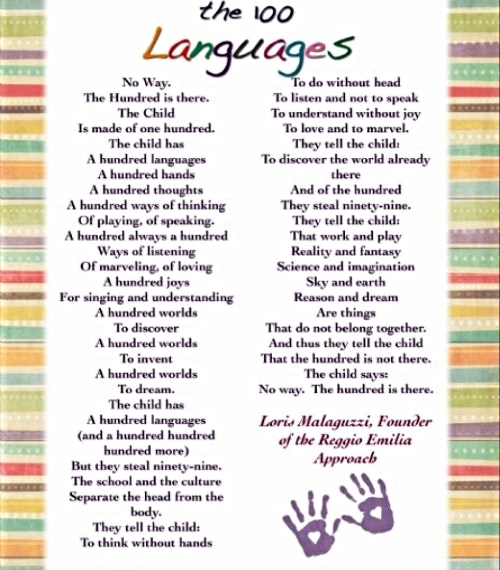From the Head of Junior School
What is your image of a child? How capable do you feel a child is? How do they learn? There was a time when adults believed that children were vessels to be filled with the knowledge adults believed they need to know. Others felt they were a blank canvas or a lump of clay waiting for an adult to mold or finish.
From birth children are very capable. They are born with a natural curiosity. A desire to inquiry and explore. They will use their sense to investigate the new. Manipulate objects and situations to help them to better understand and to make sense of their world.
Loris Malaguzzi (1920-1994) was the pedagogical leader of the Reggio Emilia early years philosophy. He believed passionately that all children are competent and capable thinkers and learners as well as creative communicators and conversationalists.
Malaguzzi wrote 'The One Hundred Languages of Children' in recognition of the multitude of ways in which they can express their ideas, thoughts, feelings or frustrations.
The child
is made of one hundred.
The child has
a hundred languages
a hundred hands
a hundred thoughts
a hundred ways of thinking
of playing, of speaking.
A hundred always a hundred…
From the poem "No way. The hundred is there."
by Loris Malaguzzi. Translated by Lella Gandini
Please click here for the full version of the poem.
The possibilities for the 'languages' are endless - dancing, dreaming, playing, questioning, singing, reasoning, imagining, listening, laughing, crying, loving, hating, painting, sculpting, exploring, experimenting.
You simply need to sit back and observe a young child in his or her play. They will engage in conversations, role play, experimentation. They will create scenarios and their own hypothesis on why something appears as it does. They are natural inquirers who love to explore. They love to create through drawing, construction, music and dance. And they love to share.
As educators and adults, it is our role to guide this process, not to dictate it. We need to provide the materials and provocations. To support the development of questioning and collaboration skills. We do not need to decide how they will learn it but to provide the environment where they are free to wonder and explore so they can construct meaning through their own real life experiences.
These experiences and ways of learning do not stop at the end of Pre-Primary. They continue into Junior School. The craft of teaching is to continue to present learning opportunities to allow children to pursue their natural inquiry skills to explore topics. To present provocations that capture a child's interest and imagination and to give them the freedom to investigate and the confidence to share and communicate.
The hundred languages are the endless number of children's potentials, their ability to wonder and to inquire. The hundred languages remind us that there are multiple ways of seeing and multiple ways of being.

Mr John Stewart
Head of Junior School